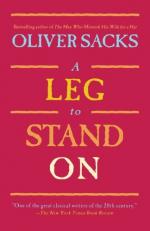
|
| Name: _________________________ | Period: ___________________ |
This quiz consists of 5 multiple choice and 5 short answer questions through Chapter 1.
Multiple Choice Questions
1. How is the material in the last chapter presented?
(a) Poetically.
(b) Concisely.
(c) Randomly.
(d) Systematically.
2. After realizing that he was the victim of the fall, what did Sacks do?
(a) Lay down and tried to think what he should do.
(b) Looked at the leg as though he did not recognize it.
(c) Examined the injured leg as though he were explaining it to a class.
(d) Gave himself a pep talk in an attempt to begin moving.
3. How long did Sacks wait before villagers carried him to the hospital?
(a) Nearly six hours.
(b) Half an hour.
(c) Less than four hours.
(d) Less than two hours.
4. How long had Sacks been traveling when he came to the swollen stream?
(a) He did not know.
(b) Half an hour.
(c) Four hours.
(d) Two hours.
5. What was the primary reason that Sacks decided not to yell a second time?
(a) He needed to conserve his strength.
(b) He was about ten miles away from the village.
(c) He was too thirsty to yell very loudly.
(d) He was afraid of angering the bull.
Short Answer Questions
1. In what publication did Sacks's first article about his injury appear?
2. What was Luria's response to Sacks's story?
3. Sacks climbed a particular stretch of ground in just over an hour. How long did it take him to descend this same stretch?
4. When Sacks began to write to Luria, where did Luria live?
5. How did Sacks splint his leg?
|
This section contains 303 words (approx. 2 pages at 300 words per page) |

|




